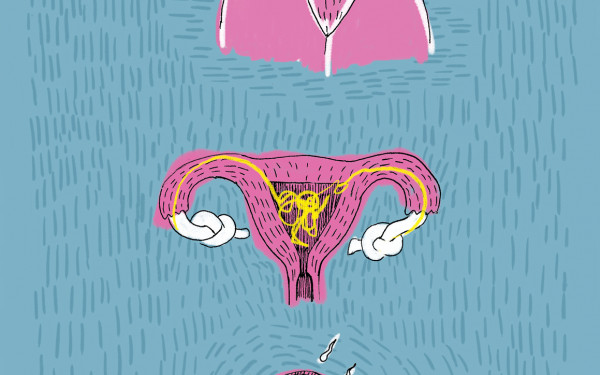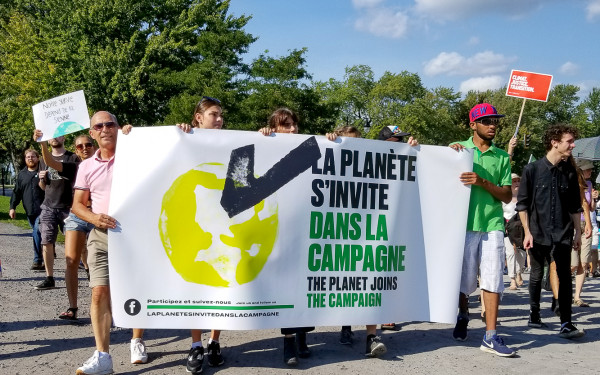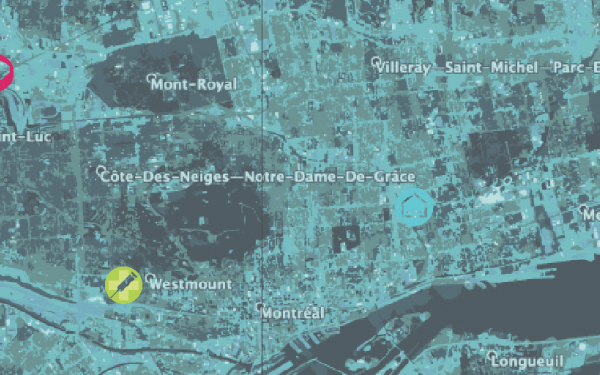Climate Catastrophe and Its Effects on Mental Health
Reports Show Climate Change Isn’t Only Melting Our Ice Caps
“I definitely think my perspective of the future has become more pessimistic. I feel an overall sense of cynicism and helplessness because I feel that one person can’t make too much of a difference on a global scale,” said Grace Feiler, a second year political science major at McGill University.
“I know that’s a bad way of looking at it, but for something as big and catastrophic as climate change, it’s easy to feel that way.”
Feiler isn’t the only one feeling gloomy about global warming. Within the last decade, climate change has undoubtedly become one of the biggest issues impacting our world. However, ecosystems and wildlife aren’t the only thing being impacted—our mental health is at risk as well.
At least six studies in recent years have found that humans’ mental health is being directly impacted by the effects of global warming. The results from studies show that changes in temperature can lead to spikes in certain types of mental illness, suicide rates, and can cause displacement of people from their communities.
According to a 2018 study published in Proceedings of the National Academy of Sciences of the United States of America, even a small rise in average monthly temperatures can be linked to an increase in mental health problems.
By examining daily meteorological data and combining this with a survey of over two million U.S. residents, researchers found that an increase of just one degree over five years was linked to a two per cent increase in mental health problems. Although this may seem like a small change, lead author of the study and research scientist at Massachusetts Institute of Technology’s Media Lab Nick Obradovich told CNN the change, “Produces approximately two million additional individuals reporting mental health difficulties.”
Obradovich also went on to state, “Exposure to hotter temperatures and higher rates of precipitation in that period produced increases in the probability that people were going to report some mental health problem in that period.”
In some cases, the effects of climate change may even be fatal. This year, the Nature Climate Change journal led a study looking into the link between temperatures and suicide. The study, conducted in the U.S. and Mexico over multiple decades, showed that if the monthly temperature is just one degree hotter than usual, suicide rates spiked by 0.7 per cent in the U.S. and by 2.1 per cent in Mexico. Because of these results, the study’s authors estimate that climate change could evoke nine to 40,000 additional suicides across the U.S. and Mexico by 2050.
How Does Climate Change Aggravate Mental Illness?
While the exact cause behind this issue is unknown, scientists have a few theories. Some theorize the same neurotransmitters used within the brain to regulate the body’s temperature are also used to control emotions. When more neurotransmitters are being used to cool the body, fewer neurotransmitters can be put towards managing emotions like aggression or impatience.
Sleepless nights may also be contributing to the decline of mental health. Climate change will lead to hotter nights in some regions, impacting our ability to get a good night’s rest. Because getting enough sleep is essential for the human body to regulate itself, sleep deprivation is the leading cause for depression and suicidal thoughts.
Eco-Anxiety and Eco-Grief
Psychologists across the world are now acknowledging that some mental health disorders are likely caused by climate change. Growing concerns about the state of our environment has led to people reporting symptoms of “eco-anxiety” or “eco-grief.” These terms have become shorthand descriptions for the existential fear stemming environmental doom. If you experience anxiety or feel depressed while you reflect on coral reefs dying, or rainforests shrinking, then you may be experiencing this condition yourself. Some other concerns plaguing those suffering from these conditions may include fear of impending natural disasters, species extinction and other climate change-related issues.
Alex Tyrrell, leader of the Green Party of Quebec, told The Link this is an issue he hears about more and more frequently.
“People are increasingly becoming conscious of mental health issues and there’s definitely a lot of people in the environmental community that do become depressed when they’re faced with all the environmental problems we have.”
When asked what plans his party have discussed to respond to this dilemma, Tyrrell said, “There’s a big issue right now where people can’t access therapy or counseling without paying for it. We’ve definitely been campaigning for a long time to have mental health services covered by medicare.”

Solastalgia: Mental and Existential Distress Caused by Environmental Change
According to the American Psychological Association, one of the most common perceptions people have when impacted by climate change is a sense of loss. We naturally form attachments to our environments when we’re around them for a long time. As climate change is constantly changing our physical environment, many experience a loss with the home they are familiar with. This can lead to a phenomenon recently labeled as solastalgia. The APA describes this as, “A sense of desolation and loss similar to that experienced by people forced to migrate from their home environment.” People who live in the countryside, such as farmers and Indigenous peoples, are also at a higher risk of experiencing the effects of solastalgia.
Migration due to climate change is predicted to increase in the next few decades. By 2050, it is projected that up to one billion people will be displaced.
External Coordinator at Sustainable Concordia and Vancouver Island native Emily Carson-Apstein has already seen the drastic impacts of climate change in her home province.
“I’m from the West Coast, and when I was a kid we didn’t really hear about forest fires that much. Now every summer it seems like everything’s on fire,” Carson-Apstein told The Link.
With more than 2,000 wildfires in British Columbia this year, the province saw its biggest wildfire season yet. The 2018 wildfire season has replaced last year’s record number of 1,353 reported fires. Carson-Apstein, who also studies music and English literature at Concordia, described how the lifestyle of British Columbia’s citizens has changed in response.
“A lot of people weren’t able to go outside last summer and a lot of towns disappeared,” said Carson-Apstein. “I also have friends who work at summer camps and they had to keep all their kids inside.”
Who is most at risk?
“Vulnerable populations that are more directly affected by climate change can then more directly be affected by the stress of the impacts of climate change,” said Juliet Donald, a clinical psychologist at Restore Your Health in Toronto.
This means that people in already hot regions are more susceptible to these negative impacts on their mental health. Quebec has recently seen increasing temperatures. Though studies have not yet been conducted in Quebec on the climate’s effect on mental health, more than 90 deaths were linked to heatwaves in the province in the summer of 2018.
Kristen Perry, a McGill environmental science graduate, also said that Indigenous people are especially at risk.
“Looking at the larger issues of colonization, racism and extractivism, you see that people who are most impacted by that are going to be more vulnerable to the effects of climate change,” said Perry. “Especially if you’re thinking of environmental racism where big extractive projects are.”
She said any extractive project, such as mining or oil extraction, force those inhabiting the area to be forcibly moved or essentially erased to facilitate the extraction to proceed.
The same study carried out by the Proceedings of the National Academy of Scientists of the United States of America also identified low-income populations as being at a higher risk of adverse effects to their mental health from climate change. They also wrote women are at a higher risk than high-income populations and men. United Nation Women wrote in a report last year that,“Climate change effects exacerbate existing gender inequalities, often resulting in more negative impacts for women.”
Women are significantly more affected by natural disasters than men. This is because of gender inequalities and power imbalances in access to resources and relevant information.
Tips for Support
If you are currently suffering from the impacts of climate change, there are a few things you can try to ease your worries. Psychologist Juliet Donald advises people first and foremost to “take steps to address anxiety of climate change.”
Perry also says that it is important to be mindful of your intake of climate-related media, “In terms of recent news, one really good thing to do is to set boundaries around your consumption of information. It’s really good to be informed, but at a certain point you don’t want to just update yourself over and over again with the same information of essentially the world coming to an end as we know it.” Alternatively, Perry suggests connecting with others who have a similar passion for the environment.
“Something that really helps me is focusing on solutions more based in community. Environmental justice organizing is something that gives me hope because I see people who are aware of issues or have lived through them, and care so much they want to do something about it.”







